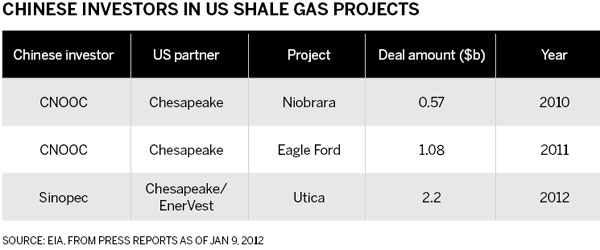Private investment
China's relaxing control over the sector will encourage privately held entrepreneurial companies to participate and will help to push up investment, even though the long-term investment (it requires about 10 years to break even) and the risk of working on dry wells will affect the ambitions of self-made enterprises to gamble on the future of the unconventional gas.
As Zhongtian's Li Jun said, diving into the shale gas sector will require tens of billion yuan investment. In this regard, private companies may consider cooperation to share risks and capital pressure.
In the US, thousands of independent enterprises flocked into the new market, bringing new technology to extract the gas from shale beds that traditional drilling methods could not remove.
By the same token, China hopes to encourage technological innovation to cope with the unique complexity of domestic geology by allowing private companies to gamble on the sector.
The widely applied technology known as hydraulic fracturing may contaminate underground water.
Concerns about the technique have been stressed in China, where environmental protection is attracting more attention.
Water shortages are a major issue in China, yet hydraulic fracturing technology requires vast quantities of water. It is claimed it contaminates waterways with the corrosive and toxic pollutant hydrogen sulfide, which Chinese shale gas contains in abundance.
Sophisticated drilling, gas purifying technologies and strict emission standards would be needed to save China from the damaging effects of drilling and air pollution, Global Data said.
CNPC's Ye said the company is considering recycling chemical fluids to cut the use of water. But he added that smaller Chinese companies have been gaining expertise of the key technologies and developing innovations.
The government said it is planning to provide subsidies to the industry with support for research and development, and will accelerate the pace of releasing more policies to support the development of the industry. However, it did not produce a timetable.
Analysts estimated that the fiscal subsidy for shale gas may parallel that for coalbed methane, which receives 0.2 yuan per square meter for drilling and extraction.
The National Energy Administration said that the current five-year plan period starting 2011 will mark a major focus on confirmed recoverable reserves and the mastering of shale gas exploration and development techniques, laying the foundation for a boost in exploitation in the next decade.
"It's a process of understanding...we're optimistic about shale gas development in China," said Li Yuxi of the Ministry of Land and Resources.

